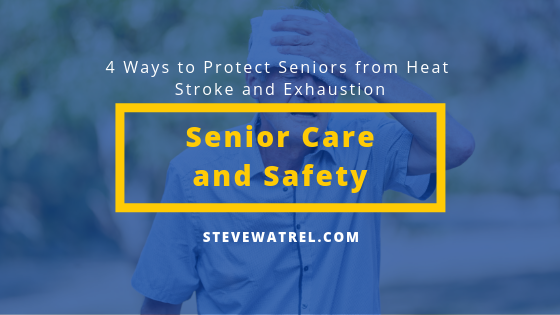Being in the Sunshine State has its advantages, such as perfect weather for the beach and more comfortable winters. However, all of that sunshine can bring dangers as well. The Florida heat can be especially dangerous for seniors when things get too hot. Here are four tips you can use to help protect seniors from heat stroke and exhaustion this summer.
Visit Seniors Regularly to Check for Signs of Heat Stroke or Exhaustion
Heat-related illnesses can be hazardous for older adults because they don’t adjust to sudden temperature changes as well as young people. Heat stroke is a serious heat-related illness that occurs when the body becomes unable to control its temperature. When the body’s temperature rises too quickly, the body loses its ability to sweat, and it is unable to cool down. Body temperatures rise to 106°F or higher within 10 to 15 minutes, which can cause death or permanent disability. Similarly, heat exhaustion is a milder form of heat-related illness that can develop after several days of exposure to high temperatures and inadequate or unbalanced replacement of fluids. Because these issues can develop quickly, family members and caregivers should check on older adults at least twice a day and watch them for signs of heat exhaustion or heat stroke. An extremely high body temperature (above 103°F), dizziness, nausea, headache, rapid heartbeat, chest pain, fainting, and breathing problems are all warning signs that help should be sought immediately.
Stay Cool and Hydrated
Dehydration is the root of many heat-related health problems. Drink plenty of water or juice, even if you’re not thirsty. But remember to avoid alcoholic or caffeinated drinks, as they can actually contribute to dehydration. Encourage seniors to increase their fluid intake by drinking refreshing, nonalcoholic beverages regardless of their activity level.
Discuss Medication Issues with Doctor
Seniors are more susceptible to heat-related issues because they are more likely to have a chronic medical condition that changes normal body responses to heat. Similarly, they are more likely to take prescription medicines that affect the body’s ability to control its temperature or sweat. The CDC recommends speaking with the doctor if the senior has limits on the amount of fluid they drink, or they are on water pills. The doctor can provide specific guidance on how much they should drink while the weather is hot.
Take Seniors to Air-Conditioned Locations
Air conditioning is almost a necessity for living in Florida during the summer. The CDC recommends that seniors not rely on a fan as their primary cooling source when it’s really hot outside. If you have an older family member whose house isn’t air-conditioned, consider taking them to a location like a mall, a library, or a movie theater. Similarly, to avoid being stuck in a car during the hottest part of the day, it’s best to help seniors accomplish their errands before noon or after 6 p.m.
Protecting older adults from heat-related illness is an essential part of providing adequate care. Whether your loved one is at home, an ALF, or a nursing home, precautions need to be taken to avoid unnecessary injury or death. If someone you know has suffered a heat-related injury due to the negligence of another, the Law Firm of Steve Watrel, P.A. can help. Send us a message online to schedule a free appointment to discuss your case.




